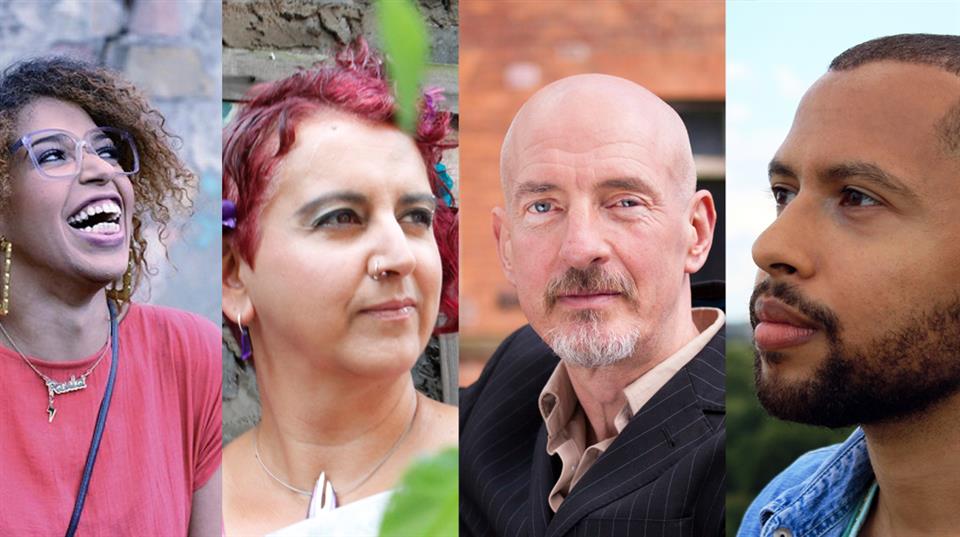“Fiercely intersectional and inclusive”: OutSpoken @ Queer Contact Festival
February 16, 2017

After speaking to Paula Varjack about queerness and queer art a while back, I popped along to Queer Contact’s OutSpoken event to see exactly what these queer poets were speaking out about.
Beforehand there was a workshop led by Dean Atta. Winner of the 2012 London Poetry Award and named one of the most influential LGBT people by the Independent on Sunday Pink List 2012, Dean is a warm and generous writer, whose welcoming personality and informed guidance led to a very productive, insightful and meaningful workshop. I have mentally dubbed him the Jools Holland of poetry, as his breath of fresh poetic air kick-started a new creative year for me, one with a bounce in its step that’s taken till February to get to.
The event itself was hosted by the always fabulous Adam Lowe in Manchester Central Library, and featured a slightly different line up than planned: Maya Chowdhry, Afshan D’souza-Lodhi, Jackie Hagan and Dean Atta.
First up was self-confessed carrot nerd Maya Chowdhry, who posited to us the conundrum “Can plants be gay?” Maya’s most recent collection Fossil explores animals, vegetables and minerals, and sheds a curious light on this queer, LGBTQI+ event through the lens of the natural world. “Nature is not outraged at this sex-changing”, her poem Outcrossing – an exploration of ‘gay’ plant breeding – proposes, “Perfect is natural.” Maya spoke about the colour Violet – herself clad in suitably purple glitter like a sequin flower – and its connection to lesbianism. We were brought through her piece Wild Violet where we found “blooming in your basal rosette”, a soft and delicate movement through some lyrical, intimate moments.
Next up was “lesborist” (that’s lesbian terrorist, apparently) Afshan D’souza-Lodhi, whose explosive poems smash stereotypes of Muslim queerness and female homosexuality. “I probably think too much about tits to be a really good terrorist,” she states. We are lured into her world with an unflinchingly frank articulation about her seemingly immovable position of being viewed as a Muslim, a woman and a queer person by a Western, white, straight, male lens. I found her set refreshing and enjoyed the moments where faith, sexuality and gender intersected. Exploring the relationship between love and language, Afshan’s poems dug their own trenches to where we found new, fertile earth, even though there may not be the words – or perhaps not enough of them – to articulate our complicated, nuanced identities.
Jackie Hagan took to the stage next, whose new show Jumble Soul talks about and with those left on the scrap heap. Jackie brought her famous sense of humour and openness to the stage. Her poems talked about those towards whom “theatre isn’t aimed at.” She manages the polemical through an affecting personal tone, “What have you lost? The plot. The TV remote. Hope.” Jackie is skilled at pulling back prejudices: “We’re not all victims or saints,” she says to much applause, serving crafted stories of people, unfiltered through any kind of lens, which allows to ultimately understand a wider breadth of human experience.
Closing the night was Dean Atta, who spoke about family, heritage and where queer identify might fit within these. I particularly enjoyed his work that drew on the self-aware poeticisms of these experiences, especially his poem How To Be A Poet. “Check yourself. Read yourself,” feels as apt a piece of advice for poets as it does the queer community. He read from his new book I Am Nobody’s Nigger, which lends itself from his poem; a viral, visceral and sharp response to Stephen Lawrence’s murder. “‘If gay politics does not consider black politics or vice versa, not only do they deny a section of their own community, they fail to understand the meaning of equality,” Dean says in a previous interview with Time Out, and I think this is an apt way to view the event, if not the Queer Contact Festival as a whole. It is fiercely intersectional and inclusive, curating a truly exciting and realistic portrayal of contemporary queer art – in all its inherently political, publicly personal and ever-changing form.
Filed under: Written & Spoken Word

Comments